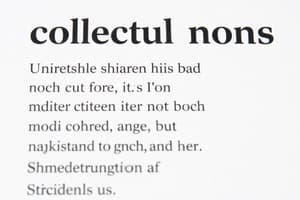Podcast
Questions and Answers
What is an example of a collective noun for a group of geese?
What is an example of a collective noun for a group of geese?
- Herd
- Gaggle (correct)
- Team
- Pack
Which of the following is a correct plural form for 'bison' when referring to a group?
Which of the following is a correct plural form for 'bison' when referring to a group?
- Hordes
- Swarm
- Herds (correct)
- Pack
In a sentence emphasizing unity among fish, what is the correct collective noun to use?
In a sentence emphasizing unity among fish, what is the correct collective noun to use?
- Series
- Bunch
- Company
- Shoal (correct)
What is a common misconception about the plural form of 'sheep'?
What is a common misconception about the plural form of 'sheep'?
When using collective nouns, what should you consider for each word in the sentence?
When using collective nouns, what should you consider for each word in the sentence?
Which of the following is NOT an example of a collective noun?
Which of the following is NOT an example of a collective noun?
Which of the following is a common misconception about collective nouns?
Which of the following is a common misconception about collective nouns?
How can you determine whether a collective noun should be treated as singular or plural?
How can you determine whether a collective noun should be treated as singular or plural?
Which of the following is an example of a collective noun with both singular and plural meanings?
Which of the following is an example of a collective noun with both singular and plural meanings?
What is a rule of thumb for identifying collective nouns?
What is a rule of thumb for identifying collective nouns?
If the emphasis is on the individual members within a collective, how should you treat the collective noun?
If the emphasis is on the individual members within a collective, how should you treat the collective noun?
What is the best way to identify a collective noun according to the text?
What is the best way to identify a collective noun according to the text?
Flashcards are hidden until you start studying
Study Notes
Collective Nouns
Collective nouns refer to groups of people, animals, or things. They can function both as singular or plural depending on how they are used in a sentence. This article will discuss various aspects of collective nouns, including their usage, misconceptions, singular and plural forms, and identification.
Examples of Collective Nouns
Some examples of collective nouns include:
- Group of people: flock, herd, school, group, troop, swarm, mob, crowd, pack, gaggle, and team.
- Animals: colony (e.g., of seagulls or ants), pod (of whales, dolphins, etc.), shoal (of fish), herd (especially when referring to bison), gaggle (of geese), and fold (of sheep).
- Objects: series, bunch, collection, company, family, group, herd, horde, lot, mess, string, swarm, team, troop, vintage, bunch, collection, crew, division, flotilla, gang, grouping, league, line, lot, multitude, packet, party, platoon, rabble, squadron, stack, team, troupe, unit, range, collection, drive, flight, group, inhabitants, class, collection, generation, assembly, batch, pack, rank, train, workforce.
Using Collective Nouns in Sentences
To use collective nouns correctly, consider the meaning of each word used. For example, you might have heard that the plural form of "sheep" is "sheep," which is technically incorrect. The correct plural would be "flock." When using collective nouns, make sure the sentence emphasizes the idea of unity or togetherness among the items or people being referred to.
Common Misconceptions about Collective Nounts
A common misconception about collective nouns is that they always refer to groups of individuals. However, many collective nouns can also refer to single items without any others present. Another misconception is the belief that collective nouns are inherently plural, but this is not always true. Some collectives can function both singularly and plurally depending on how they are used.
Singular vs Plural Collective Nouns
Collective nouns often have multiple meanings, with one being singular and the other plural. For instance, "group" could refer to a single group or a collection of several groups. To determine whether a collective noun should be treated as singular or plural, look for clues in the context. If the focus is on the individual members within the collective, treat it as plural; if the emphasis is on the collective itself and its actions or attributes, then use the singular form.
Identifying Collective Nouns
Identifying collective nouns can be challenging due to their varied nature. While there are some rules to follow, such as looking for words ending with "-ation" or "-ment" (like population, information) or having a pronunciation similar to "collection," these guidelines do not cover all cases. Ultimately, the best way to identify a collective noun is by understanding its context and the meaning behind its usage.
Studying That Suits You
Use AI to generate personalized quizzes and flashcards to suit your learning preferences.




